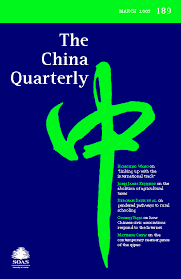Every sector of Chinese society has become more constrained under Xi Jinping. The Communist Party, private business, the media and internet, civil society and academia have all been affected by moves to reign in their “degrees of freedom”. For better or worse, this is the prerogative of the Chinese leadership. What I am about to write is thus not about imposing my “western values” on China or dictating how China should be run. Instead, it is about “us”, western societies, institutions, businesses and individuals, and how we conduct ourselves in our interactions with China.
Given the tightening parameters of China’s authoritarian information order, it was only a matter of time until western publishers became a target for exerting greater control. The first target, Cambridge University Press, initially acceded to demands from Chinese authorities to remove content from its website in China, only to reverse track when the backlash from academics threatened lasting reputational damage. Other publishers have followed. Some, like MIT, Oxford and Chicago University Press have said they will not self-censor. Sage meanwhile suggested that it would if asked.
Springer Nature stands out, not only because of its status as one of the world’s largest academic trade presses, but because it actively barred access to some of its content to Chinese internet users. Moreover, Springer Nature has been admirably forthright in defending its decision to do so. Its rationale is that removing a small portion of its catalogue (albeit over 1,000 articles) was a small price to pay for continuing to provide access to material deemed agreeable to the Chinese state.
As an economic argument, it is unassailable. The offending materials come exclusively from journals publishing work on Chinese politics and related fields – a negligible part of Springer Nature’s output. The economic impact is especially minimal when compared to consumption in China itself, where medical, engineering, business and language-learning texts are in high and lucrative demand.
It is when we go beyond purely economic cost-benefit analysis that Springer Nature’s decision raises serious issues. By allowing the Chinese government to decide what is legitimate knowledge the publisher undermines the ethos (freedom of thought and dissemination) and the process (review by peers not political officials) on which academic research is predicated. If that is so, we might question the legitimacy of Springer Nature’s role in the academic sector. How can we trust the integrity of an academic institution (which is what presses are whether they are also commercial enterprises or not) if the ultimate arbiter of academic research is outsourced to an unrelated body whose primary criteria is not academic but political?
When I submit my work to an academic publisher (based on my labour that is paid for by the British taxpayer), I enter an informal contract based on trust that the submission will be stringently but fairly reviewed by academically competent persons who are picked by the publisher and whose identity I do not know. If my work is deemed by blind peer review to make a contribution to knowledge, I trust that the press will publish it in accordance with the sector’s standards in a timely fashion and make it available to all subscribers.
If this process is not adhered to, that betrays not just my trust but that of all academic colleagues. The decision whether an essay is a contribution to knowledge must not be outsourced to a government whose primary concern is political correctness.
This may sound overly abstract given the “negligible” practical impact. The readership of the blocked content in China is likely very small. However, there are practical implications. In some cases, for example where Chinese academics have had their articles removed, it could affect professional advancement. The years of dedication and hard work required to publish academic research could, in theory, be negated as authors are denied promotions or tenure due to the idiosyncrasies of a crude keyword search (the method Springer Nature appears to have employed).
At the present time, the likelihood of such extreme hypothetical scenarios is low. But, my major concern is that we are at the beginning of a long downward spiral. A precedent has been set. What can Springer Nature do but accede to the Chinese authorities’ wishes next time it decides to demand content removed? Today it is “highly sensitive” topics like Tibet and the Cultural Revolution that have been removed; tomorrow it may be slightly less sensitive topics and so on. This is a slippery slope, the end point of which is conforming with the Chinese definition of legitimate knowledge.
As I said, I am not here to tell the Chinese authorities what they should do. But I must state that for academics outside China it is an intolerable intrusion on our fundamental freedoms to have the merits of one’s professional output dictated by a foreign government.
Which brings me to my final point. As China’s global engagement intensifies, as Chinese interests and confidence to assert and protect them increases, it is inevitable that they will come into contact with our own. It is therefore essential that in western academia, and in western societies more generally, we consider our own interests and values. We need to decide what we value and what we are willing to do to protect it. Do we value the freedoms of academic inquiry and expression? Or are those values that we are willing to compromise?
This piece was originally published in Development and Cooperation.

